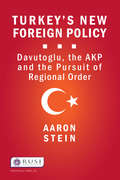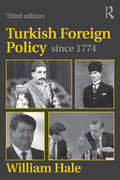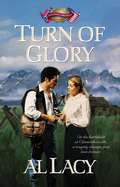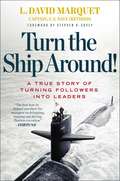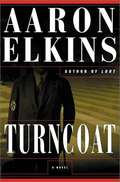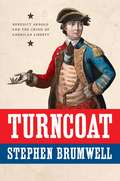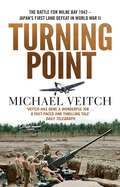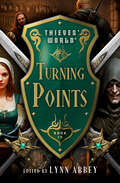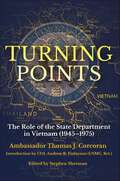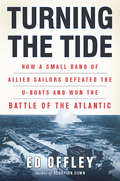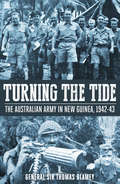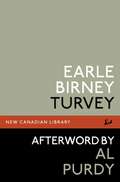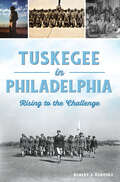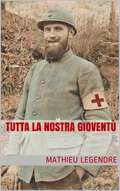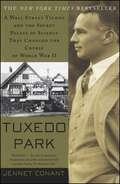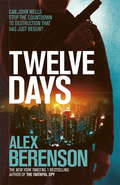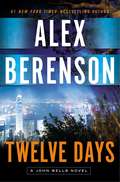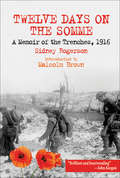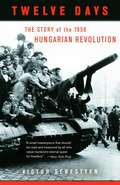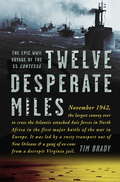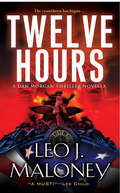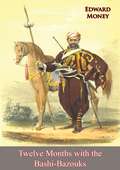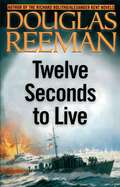- Table View
- List View
Turkey's New Foreign Policy: Davutoglu, the AKP and the Pursuit of Regional Order (Whitehall Papers)
by Aaron SteinTurkey’s Justice and Development Party (AKP), after coming to power in 2002, sought to play a larger diplomatic role in the Middle East. The AKP adopted a proactive foreign policy to create ‘strategic depth’ by expanding Turkey’s zone of influence in the region, drawing on the opportunities of geography, economic power and imperial history to reconnect the country with its historical hinterland. Yet despite early promise, this policy came undone after the Arab upheavals of 2011 and has seen Turkey increasingly at odds with its neighbours and the West. Turkey's New Foreign Policy outlines the key tenets of the AKP’s policy of strategic depth in the Middle East and how this marks a departure from traditional Turkish foreign policy. Particular attention is focused on the Turkish reaction to the political changes that swept through the Arab world – including the Syrian civil war – and presented Turkey with its most significant foreign-policy challenge to date. Based on extensive primary research of Turkish-language sources, this monograph argues that political changes in the Middle East have precipitated a serious decline in Turkish regional influence, reversing earlier gains in influence after the AKP came to power. However, despite these foreign-policy defeats, the AKP has shown little indication that it is willing to scale back its ambitions, insisting that it stands on the right side of history – drawing a clear distinction between Turkey and the West.
Turkish Foreign Policy since 1774
by William HaleThis revised and updated version of William Hale’s Turkish Foreign Policy 1774-2000 offers a comprehensive and analytical survey of Turkish foreign policy since the last quarter of the eighteenth century, when the Turks’ relations with the rest of the world entered their most critical phase. In recent years Turkey’s international role has changed and expanded dramatically, and the new edition revisits the chapters and topics covered in light of these changes. Drawing on newly available information and ideas, the author carefully alters the earlier historical narrative while preserving the clarity and accessibility of the original. Combining the long historical perspective with a detailed survey and analysis of the most recent developments, this book fills a clear gap in the literature on Turkey’s modern history. For readers with a broader interest in international history, it also offers a crucial example of how a medium sized power has acted in the international environment.
Turn of Glory: Battle of Chancellorsville (Battles of Destiny #8)
by Al LacyAt the Battle of Chancellorsville, four soldiers risk their lives to come to the aid of their friend Rance Dayton while he is under fire. An official commendation from General Stonewall Jackson follows, and the four are proclaimed heroes. But in a matter of days, their lives change drastically when the four mistake General Jackson and other approaching riders for Union soldiers and open fire. Jackson is killed and the four former heroes, now hounded and shamed, head west and turn to lives of crime. And it is Rance Dayton, now a U.S. marshal, who must bring the outlaws to justice.(From the Trade Paperback edition.)
Turn the Ship Around!
by David Marquet"Leadership should mean giving control rather than taking control and creating leaders rather than forging followers. ” David Marquet, an experienced Navy officer, was used to giving orders. As newly appointed captain of the USS Santa Fe, a nuclear-powered submarine, he was responsible for more than a hundred sailors, deep in the sea. In this high-stress environment, where there is no margin for error, it was crucial his men did their job and did it well. But the ship was dogged by poor morale, poor performance, and the worst retention in the fleet. Marquet acted like any other captain until, one day, he unknowingly gave an impossible order, and his crew tried to follow it anyway. When he asked why the order wasn’t challenged, the answer was "Because you told me to. ” Marquet realized he was leading in a culture of followers, and they were all in danger unless they fundamentally changed the way they did things. That’s when Marquet took matters into his own hands and pushed for leadership at every level. Turn the Ship Around! is the true story of how the Santa Fe skyrocketed from worst to first in the fleet by challenging the U. S. Navy’s traditional leader-follower approach. Struggling against his own instincts to take control, he instead achieved the vastly more powerful model of giving control. Before long, each member of Marquet’s crew became a leader and assumed responsibility for everything he did, from clerical tasks to crucial combat decisions. The crew became fully engaged, contributing their full intellectual capacity every day, and the Santa Fe started winning awards and promoting a highly disproportionate number of officers to submarine command. No matter your business or position, you can apply Marquet’s radical guidelines to turn your own ship around. The payoff: a workplace where everyone around you is taking responsibility for their actions, where people are healthier and happier, where everyone is a leader. .
Turn the Ship Around!
by David Marquet"Leadership should mean giving control rather than taking control and creating leaders rather than forging followers." David Marquet, an experienced Navy officer, was used to giving orders. As newly appointed captain of the USS Santa Fe, a nuclear-powered submarine, he was responsible for more than a hundred sailors, deep in the sea. In this high-stress environment, where there is no margin for error, it was crucial his men did their job and did it well. But the ship was dogged by poor morale, poor performance, and the worst retention in the fleet. Marquet acted like any other captain until, one day, he unknowingly gave an impossible order, and his crew tried to follow it anyway. When he asked why the order wasn't challenged, the answer was "Because you told me to." Marquet realized he was leading in a culture of followers, and they were all in danger unless they fundamentally changed the way they did things. That's when Marquet took matters into his own hands and pushed for leadership at every level. Turn the Ship Around! is the true story of how the Santa Fe skyrocketed from worst to first in the fleet by challenging the U.S. Navy's traditional leader-follower approach. Struggling against his own instincts to take control, he instead achieved the vastly more powerful model of giving control. Before long, each member of Marquet's crew became a leader and assumed responsibility for everything he did, from clerical tasks to crucial combat decisions. The crew became fully engaged, contributing their full intellectual capacity every day, and the Santa Fe started winning awards and promoting a highly disproportionate number of officers to submarine command. No matter your business or position, you can apply Marquet's radical guidelines to turn your own ship around. The payoff: a workplace where everyone around you is taking responsibility for their actions, where people are healthier and happier, where everyone is a leader.
Turn the Ship Around!: A True Story of Turning Followers into Leaders
by Stephen R. Covey L. David MarquetSince Turn the Ship Around! was published in 2012, hundreds of thousands of readers have been inspired by former Navy captain David Marquet’s true story. Many have applied his insights to their own organizations, creating workplaces where everyone takes responsibility for his or her actions, where followers grow to become leaders, and where happier teams drive dramatically better results. Marquet was a Naval Academy graduate and an experienced officer when selected for submarine command. Trained to give orders in the traditional model of leadership, he faced a new wrinkle when he was shifted to the Santa Fe, a nuclear powered submarine, at the last minute. Facing the high-stress environment of a sub where there’s little margin for error, he was determined to reverse the trends he found: poor morale, poor performance, and the worst retention rate in the fleet, on board a submarine he didn't know. Almost immediately, Marquet ran into trouble when he unknowingly gave an impossible order, and his crew tried to follow it anyway. When he asked why the order wasn’t challenged, the answer was “Because you told me to.” Marquet realized that while he was trained for a different submarine, his crew had been trained to do what they were told -- a deadly combination.That’s when Marquet flipped the leadership model and pushed for leadership at every level. Turn the Ship Around! reveals how the Santa Fe skyrocketed from worst to first in the fleet by challenging the U.S. Navy’s traditional leader-follower approach. Struggling against his own instincts to take control, he instead achieved the vastly more powerful model of giving control to his subordinates. Before long, each member of Marquet’s crew became a leader and assumed responsibility for everything he did, from clerical tasks to crucial combat decisions. The crew became fully engaged, contributing their full intellectual capacity every day. The Santa Fe set records for performance, morale, and retention. Over the next decade, the officers of the Santa Fe were selected to become submarine commanders in highly disproportionate numbers. Whether you need a major change of course or just a tweak of the rudder, you can apply Marquet’s methods to turn your own ship around.
Turncoat
by Aaron ElkinsFrom Edgar Award winner Aaron Elkins comes a gripping masterwork of suspense, an astonishing, globe-spanning adventure that plunges an ordinary man in a deadly morass of lies, guilt, murder, and terrible secrets spawned when a world exploded in war. Pete Simon's all-American life was everything he ever wished for: a good home, a satisfying career, and a marriage still strong and loving after nearly twenty years. But in the days following the assassination of John F. Kennedy, everything is about to change. And it begins with the appearance of a stranger at his door. The man ranting madly about money, death, and forgiveness is unknown to Pete-but not to his distraught wife, Lily. Only when the man has gone does the truth come out. The unwelcome visitor was Lily's father, whom she had claimed died long ago in their native France. The next day he is dead, his savagely beaten body washed up in a nearby marsh-and Lily disappears, leaving a note behind begging Pete not to follow her. As a nation mourns its fallen leader, Pete Simon is devastated by a tragedy of his own. Now, with a business card from an antiques dealer in Barcelona as his only lead, he sets out to find his missing wife, embarking on a twisted and perilous journey that will carry him to Europe, where the hideous crimes of the Nazi aggressors remain fresh in the minds of those who cannot forget... or forgive. But each door Pete opens leads him deeper into a painful and shocking past, slowly revealing secrets of greed, terror, guilt, and treacherous collaboration with a monstrous enemy that could shatter everything he believes in and destroy everything he loves. And suddenly he has become more than a concerned husband and seeker of a bitter truth; he has become the target of desperate, dangerous men and their terrifying vengeance. A haunting parable of good and evil and the many shifting shades of humanity in between, Aaron Elkins's Turncoat is an extraordinary reading experience, a compelling, provocative, and rocket-paced roller- coaster ride with surprises at every turn that will leave the reader breathless.
Turncoat: Benedict Arnold and the Crisis of American Liberty
by Stephen BrumwellA historian examines how a once-ardent hero of the American Revolutionary cause became its most dishonored traitor. General Benedict Arnold&’s failed attempt to betray the fortress of West Point to the British in 1780 stands as one of the most infamous episodes in American history. In the light of a shining record of bravery and unquestioned commitment to the Revolution, Arnold&’s defection came as an appalling shock. Contemporaries believed he had been corrupted by greed; historians have theorized that he had come to resent the lack of recognition for his merits and sacrifices. In this provocative book Stephen Brumwell challenges such interpretations and draws on unexplored archives to reveal other crucial factors that illuminate Arnold&’s abandonment of the revolutionary cause he once championed. This work traces Arnold&’s journey from enthusiastic support of American independence to his spectacularly traitorous acts and narrow escape. Brumwell&’s research leads to an unexpected conclusion: Arnold&’s mystifying betrayal was driven by a staunch conviction that America&’s best interests would be served by halting the bloodshed and reuniting the fractured British Empire. &“Gripping… In a time when charges of treason and disloyalty intrude into our daily politics, Turncoat is essential reading.&”—R. R. B. Bernstein, City College of New York &“The most balanced and insightful assessment of Benedict Arnold to date. Utilizing fresh manuscript sources, Brumwell reasserts the crucial importance of human agency in history.&”—Edward G. Lengel, author of General George Washington &“An incisive study of the war and the very meaning of the American Revolution itself…. The defining portrait of Arnold for the twenty-first century.&”—Francis D. Cogliano, author of Revolutionary America
Turning Point: The Battle for Milne Bay 1942 - Japan's first land defeat in World War II
by Michael VeitchSeptember 1942 marked the high-point of Axis conquest in World War II. In the Pacific, Japan's soldiers had seemed unstoppable. However, the tide was about to turn.On Sunday, 6 September 1942, Japanese land forces suffered their first conclusive defeat at the hands of the Allies. At Milne Bay in Papua New Guinea, a predominantly Australian force - including 75 Squadron (fresh from their action in 44 Days) - fought for two weeks to successfully defend a vital airstrip against a determined Japanese invasion. The victorious Australian army units were crucially supported by two locally-based squadrons of RAAF Kittyhawks.The Battle for Milne Bay and victory for the Allies was a significant turning point in the Pacific War, but while it received worldwide publicity at the time, it has since been largely forgotten... It deserves to be remembered. Michael Veitch, actor, presenter and critically acclaimed author, brings to life the incredible exploits and tragic sacrifices of these Australian heroes in another fast-paced and thrilling tale.
Turning Points (Thieves' World®)
by Lynn AbbeyDark divinations spell trouble for a lawless city in this shared-world fantasy anthology edited by the New York Times–bestselling author of Sanctuary. &“Amusingly &‘low&’ fantasy adventure, varied enough to appeal to those who have had their fill of Tolkien and want funnier, nastier stuff.&” —Kirkus Reviews Surviving is a full-time occupation for the citizens of Sanctuary. A city shaped by magic, evil, and political intrigue, she has weathered natural disasters and man-made calamities for ages. The great priest, Molin Torchholder preserved her history and secrets. All his knowledge has since passed along to Cauvin, a stonemason who is now a reluctant advisor to Sanctuary&’s current master, the Irrune chieftain Arizak. Beckoned to the palace, Cauvin hears a troubling prophecy. The shadows are coming, bringing with them sorcery, the likes of which the city hasn&’t seen in decades. Sanctuary has reached a turning point. With new dangers on the way and a dead man haunting his thoughts, Cauvin must find a way to ensure his home&’s continued survival . . . Welcome back to Sanctuary and prepare to meet an eccentric cast of characters like Halott the Necromancer, Latilla the daughter of the legendary artist Lalo the Limmer, Dysan the short and scrappy thief, and Jake the Rat! The shared-world anthology returns with stories by Raymond E. Feist, Dennis L. McKiernan, Mickey Zucker Reichert, Diana Paxson, Jody Lynn Nye, Lynn Abbey, and many more.&“Shapechangers, wizards, cutpurses, and assassins share the spotlight in stories by Lynn Abbey, Raymond Feist, Andrew Offut, and others. Fans of the original &‘Thieves&’ World&’ series should enjoy this volume, a sequel to Abbey&’s novel Sanctuary and a harbinger of other volumes to come. A good choice for most fantasy collections.&” —Library Journal
Turning Points: The Role of the State Department in Vietnam (1945–1975)
by Ambassador Thomas J. Corcoran Col. Andrew R. Finlayson (USMC, Ret.)"...a valuable addition to Vietnam War historiography." — The VVA Veteran Ten years after the end of the American involvement in the Vietnam War, a career Foreign Service officer, Thomas J. Corcoran, set down in writing his thoughts on the history of US State Department policy during America’s involvement with South Vietnam. Like many Americans of his generation, he was perplexed by the failure of America to achieve its goals in South Vietnam. As an ambassador and with over 30 years of diplomatic experience—beginning in 1948 when he was assigned to Hanoi and involving other postings in Southeast Asia—he brought to his analysis a long and rich personal experience with events in Laos, Cambodia, and Vietnam. The result is a thoughtful, objective and well-researched study that chronicles the key policy decisions made by the US State Department throughout the entire period from 1945 to 1975; decisions that ultimately led to the first war lost by the United States. In his extensive study, Corcoran does an excellent job of exposing many of the myths and falsehoods found in orthodox histories of U.S. involvement in Vietnam.
Turning the Tide: How a Small Band of Allied Sailors Defeated the U-boats and Won the Battle of the Atlantic
by Ed OffleyThe United States experienced its most harrowing military disaster of World War II not in 1941 at Pearl Harbor but in the period from 1942 to 1943, in Atlantic coastal waters from Newfoundland to the Caribbean. Sinking merchant ships with impunity, German U-boats threatened the lifeline between the United States and Britain, very nearly denying the Allies their springboard onto the European Continent--a loss that would have effectively cost the Allies the war.In Turning the Tide, author Ed Offley tells the gripping story of how, during a twelve-week period in the spring of 1943, a handful of battle-hardened American, British, and Canadian sailors turned the tide in the Atlantic. Using extensive archival research and interviews with key survivors, Offley places the reader at the heart of the most decisive maritime battle of World War II.
Turning the Tide: The Australian Army in New Guinea 1942-43
by Field Marshal Sir Thomas Albert BlameyTurning the Tide, first published in 1944 as The Jap was Thrashed: An Official Story of the Australian Soldier – First Victor of the “Invincible Jap”, is a World War II account of the Australian Army's battle and eventual defeat of Japanese forces in portions of New Guinea (Milne Bay, the Owen-Stanleys, Buna, Gona, and Sanananda) in 1942-43. The battles were important as they represented the first defeats for the Japanese, and marked the beginning of a turn-around in the Pacific for Allied armies. The book shows the transformation of inexperienced, poorly equipped Australian recruits into battle-hardened, effective soldiers successfully fighting their way across inhospitable terrain against a determined enemy. Included are 12 pages of maps and 32 pages of photographs.
Turvey
by Earle Birney Al PurdyPrivate Thomas Leadbeater Turvey is nobody's idea of a capable recruit. Shifted from regimental pillar to post, Turvey tries and fails at every odd job in the army with a remarkable genius for mishap. A casualty before he has a chance to see action, Turvey watches the maimed and dying return from the front; thus Earle Birney's comic masterpiece becomes an unforgettable indictment of war. Turvey won the Stephen Leacock Medal for Humour in 1949.
Tuskegee in Philadelphia: Rising to the Challenge (American Heritage Ser.)
by Robert J KodoskyThe uplifting story of the African American Philadelphians who joined the prestigious WWII unit to serve as fighter pilots, nurses, mechanics, and more. At the outbreak of World War II, Philadelphians heeded the call, including the valiant airmen and women of Tuskegee. Although trained in Alabama, the prestigious unit comprised dozens of Philadelphia-area natives, second only to Chicago in the country. They served as fighter pilots, bombers, nurses, and mechanics, as well as in many other support roles. The African American service members had to overcome racism and sexism on the home front in order to serve with great distinction. Their battle for equality didn&’t end at the war&’s conclusion. Tuskegee alumni continued to serve their nation by working to secure civil rights and serve their community back home in Philadelphia. In this book, historian Robert Kodosky presents the trials and triumphs of Philadelphia&’s Tuskegee airmen and women. Includes photographs
Tutta la nostra gioventù
by Mathieu LegendreL'odissea del barelliere Tabouret. Dal 1914 al 1919, seguite Camille Tabouret sui principali teatri operativi del fronte francese. Adattando l'originale diario di guerra di Camille Tabouret, Mathieu Legendre ne ha fatto un racconto dinamico e moderno e ci fa scoprire la Der des Der in un modo originale. Accompagniamo Camille nella sua missione di recuperare i feriti e i morti vicinissimo alle linee nemiche, nell'inferno delle trincee e degli spostamenti del suo reggimento. Sopravvivendo a questo conflitto, Camille ci ha lasciato una testimonianza notevole, ora accessibile a tutti.
Tuxedo Park: A Wall Street Tycoon and the Secret Palace of Science That Changed the Course of World War II (Biography Ser.)
by Jennet ConantA New York Times bestseller! The untold story of the eccentric Wall Street tycoon and the circle of scientific geniuses who helped build the atomic bomb and defeat the Nazis—changing the course of history.Legendary financier, philanthropist, and society figure Alfred Lee Loomis gathered the most visionary scientific minds of the twentieth century—Albert Einstein, Werner Heisenberg, Niels Bohr, Enrico Fermi, and others—at his state-of-the-art laboratory in Tuxedo Park, New York, in the late 1930s. He established a top-secret defense laboratory at MIT and personally bankrolled pioneering research into new, high-powered radar detection systems that helped defeat the German Air Force and U-boats. With Ernest Lawrence, the Nobel Prize–winning physicist, he pushed Franklin Delano Roosevelt to fund research in nuclear fission, which led to the development of the atomic bomb. Jennet Conant, the granddaughter of James Bryant Conant, one of the leading scientific advisers of World War II, enjoyed unprecedented access to Loomis’ papers, as well as to people intimately involved in his life and work. She pierces through Loomis’ obsessive secrecy and illuminates his role in assuring the Allied victory.
Twelve Days
by Alex BerensonThose in power always need an unofficial option.Meet John Wells.Wells and his former CIA bosses Ellis Shafer and Vinnie Duto have uncovered a false-flag operation to convince the President to attack Iran. But with no hard evidence, no one at the top will listen.The President has set a deadline for Iran to give up its nuclear program, and the mullahs in Tehran - furious and frightened - have responded with a deadly terrorist attack. Wells and his team now have only twelve days to prove their theory. From Switzerland to Saudi Arabia, Israel to Russia, they desperately pursue all clues, while the United States orders forces into place and Iran mobilizes a squad of suicide bombers.As the deadline approaches, will Wells be able to do enough to stop a full-scale escalation into war?
Twelve Days (John Wells #9)
by Alex BerensonJohn Wells has only twelve days to stop the United States from being tricked into invading Iran in the new cutting-edge novel of modern suspense from the #1 New York Times–bestselling author.<P><P> Twelve days.<P> Wells, with his former CIA bosses Ellis Shafer and Vinnie Duto, has uncovered a staggering plot, a false-flag operation to convince the President to attack Iran. But they have no hard evidence, and no one at Langley or the White House will listen.<P> Now the President has set a deadline for Iran to give up its nuclear program, and the mullahs in Tehran—furious and frightened—have responded with a deadly terrorist attack. Wells, Shafer, and Duto know they have only twelve days to find the proof they need. They fan out, from Switzerland to Saudi Arabia, Israel to Russia, desperately trying to tease out the clues in their possession. Meanwhile, the United States is moving soldiers and Marines to Iran’s border. And Iran has mobilized its own squad of suicide bombers.<P> And as the days tick by and the obstacles mount, they realize that everything they do may not be enough…
Twelve Days on the Somme: A Memoir of the Trenches, 1916
by Sidney RogersonThis “brilliant and heartrending” memoir recounts one of the bloodiest battles of WWI—with a new introduction and a forward by the author’s son (John Keegan).A joint operation between Britain and France, the 1916 Battle of the Somme was an attempt to gain territory and dent Germany’s military strength. By the end of the action, the Allied Forces had made just twelve kilometers. For this slight gain, more than a million lives were lost.In this classic military memoir, Staff Sergeant Sidney Rogerson vividly captures the last spell of frontline duty performed by the 2nd Battalion of the West Yorkshire Regiment. Awarded the George Cross for his service, Rogerson gives a frank and moving account of this notorious battle while demonstrating how he and his fellow soldiers faced the ordeal with resilience and good humor.This edition includes a new introduction by Malcolm Brown and a Foreword by Rogerson’s son Commander Jeremy Rogerson.
Twelve Days: The Story of the 1956 Hungarian Revolution
by Victor SebestyenA native of Hungary, Sebestyen lives in England where he has worked for numerous British newspapers, including the London Evening Standard; his family fled from Hungary when he was a small child. On the 50th anniversary of the Hungarian Revolution, he presents a new account of the event, based on newly released official Hungarian and Soviet documents, his family's diaries, and eyewitness testimony. The text demonstrates that Hungary was "... just one battleground in the great East-West struggle in the second half of the twentieth century... a pawn, trapped between bigger powers" of Moscow and Washington, D.C.
Twelve Desperate Miles
by Tim BradyThe Dirty Dozen meets Band of Brothers in this true story of how a rusty old New Orleans banana boat staffed with an unlikely crew of international merchant seamen, a gang of inmates from a local jail, and a French harbor pilot spirited out of Morocco by O.S.S. agents in the trunk of a Chevy, were drafted into service in WWII -- and heroically succeeded in setting the stage for Patton's epic invasion of North Africa. The largest amphibious invasion force ever to cross the Atlantic Ocean set sail from Virginia for North Africa in November 1942. Operation Torch was the true beginning of the liberation of Europe since control of Northwestern Africa -- Morocco, Algeria, and Tunisia -- gave the Allies a base on the Mediterranean for the coming invasion of southern Europe. The prime objectives of the Moroccan invasion, headed by General George Patton, were the port city of Casablanca and an airfield 60 miles northeast of the city, which had the only concrete runways in the region. Unfortunately, the field was located a dozen miles up a shallow, twisting Moroccan river that wound its way down from the Atlas Mountains to the Atlantic. Patton needed five hundred tons of highly volatile airplane fuel and nine hundred tons of bombs delivered to that Moroccan airport to supply his planned air campaign against Casablanca, but he faced a major challenge: the river was too shallow for any available transport ship in the entire Allied fleet. As the clock ticked down on the invasion, the War Department searched every harbor and cove in the Atlantic and only at the last moment turned up the Contessa, a salt-caked, rust-stained Honduran-registered civilian freighter that had spent most of her undistinguished career hauling bananas and honeymooners from New Orleans to the river port harbors of the Caribbean. But at least she would be capable of hauling heavy cargo in shallow waters. Twelve Desperate Miles tells the incredible story of the Contessa's role in the opening salvo of World War II. This unremarkable ship, crewed by seamen from twenty-six different nations and eighteen sailors pulled from the Norfolk County jail, became the focus of the first invasion of the war as it was rushed to Virginia at the insistence of George Patton and quickly retrofitted for war. Too late to join the safety of the massive convoy sailing for Africa, the Contessa set out on her own through the U-Boat-infested waters of the Atlantic to the shores of Morocco, where she faced her final and most daunting challenge: the twelve mile voyage up the shallow and well-defended Sebou River, carrying an explosive cocktail of gasoline and bombs in her holds. In Twelve Desperate Miles, veteran history writer Tim Brady chronicles one of the great untold stories of the war. This surprising and entertaining account of the baptism of American forces on the Western Front is a mix of Moroccan intrigue, portraits of some of the great figures of the war (Patton, Eisenhower, Marshall, General Lucian Truscott) at its outset, snapshots of the daily workings of the colorful crew of a merchant ship, along with a thrilling account of the invasion of French Morocco. Twelve Desperate Miles offers a unique and fascinating picture of the war in its opening moments.
Twelve Hours (A Dan Morgan Thriller)
by Leo J. MaloneyThe acclaimed author and Black Ops veteran delivers a tale of international intrigue on the verge of WWIII in this military thriller novella. New York City is under siege. A bomb has exploded in Penn Station. Islamic terrorists have occupied the Waldorf Astoria. And a bloody, catastrophic battle is being fought in Grand Central Station. It&’s all part of an insidious plot targeting a visiting head of state. CIA veteran Dan Morgan knows what he has to do to prevent an irreversible domino effect from bringing the world to its knees. There&’s just one catch. Dan&’s teenage daughter is trapped among the hostages. And she&’s determined to fight her way out . . . &“A must!&” —Lee Child
Twelve Months with the Bashi-Bazouks
by Edward MoneyA fascinating account of the Crimean War by a British officer who served with the Bashi-Bazouks during the Crimean War.
Twelve Seconds to Live
by Douglas ReemanThe mine is an impartial killer, and defusing it requires steady nerves, steady hands, and an intrepid flirtation with death. Haunted by the mine that destroyed his first command, H.M. Submarine Tornado, Lieutenant-Commander David Masters now defuses mines on land and teaches the same deadly science to others.
